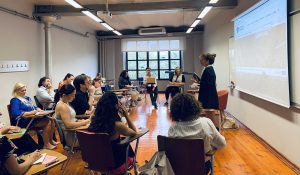This is one of the most personal posts I’ve ever written. Based on one of the most personal stories I’ve ever shared – and I have PEXforum Istanbul to thank for both opportunities.

Filiz Bikmen addresses a small group discussion at PEXforum 2022 in Istanbul.
With 20-plus years of working in philanthropy and civil society, I’ve been invited to share my voice in many forms and outlets. Yet all this time I was leading with my rational voice, muffling my intuitive one.
Thanks to the PEXforum gathering in Istanbul last week, I was invited to discover and allow that voice to emerge.
As if attending a gathering like this after nearly three years, seeing old colleagues and meeting new ones was not moving enough, I was invited to share my story in a session about challenges facing young people in Turkey. A story that had deeper roots in my soul than I had realized.
Turkey is the country of my parent’s origin, and for more than 20 years, a place I call home. Where I’ve worked to promote philanthropy and enable civil society in many realms, filling me with hope. Yet also, at times, a place leaving me with feelings of helplessness and hopelessness.
My late father, a psychiatrist, was a great fan of Dr Viktor Frankl, author of Mans Search for Meaning, whose practices centred on the importance of meaning (which bears hope) in one’s quest to keep living.
I was greatly inspired by my dear father in many ways. When I was a student, I came across the concept of learned optimism (Dr Martin Seligman) which led me to study organizational psychology – and I think ultimately- chose to work in philanthropy.
In addition to enabling environment, research and ecosystem development work, over the past decade I worked deeply in the area of youth development. Using all the tools in my rational analytical toolbox, I assisted youth-focused/led NGOs in accessing and effectively employing EMpower Emerging Markets Foundation funds. NGOs that work tirelessly to help children and youth from Turkey (including different minority groups as well as Syrian refugee children) overcome all kinds of barriers to education, psychological/physical well-being and economic opportunities.
I was also invited to design a social investment strategy for youth school-to-work transitions for Esas Sosyal, and a program that focuses on giving a ‘First Chance’ to youth facing barriers in finding first jobs.
These efforts were guided by carefully crafted KPIs and the like, careful to measure and report results that strategic funders seek. All is well and good – as interventions need to be assessed on some metric to determine if the problem and proposed solution align.
Yet what about hope?
How much do we think about hope in the context of our work, as we work to meticulously develop metric frameworks? Do we give youth something to look forward to? Are we doing anything to help young people unlearn feelings of helplessness? Are we supporting them in learning to be more optimistic and hopeful?
Above all, is it even possible to learn to be hopeful? The answer is an overwhelming yes- and the research proves it (see the book Learned Optimism by Dr Martin Seligman and his later works).
I am asking myself these questions more directly these days, as I find the currency of hope to be the most valuable of all resources.
I am certainly more mindful of how hope affects our systems change work, and how that connects to an internal change in the lives of youth and children.
Such ‘lenses of hope’ should be more present in our work with change-making organizations, and in our tracking and reporting as grantmakers.
Now, more than ever is the time to increase the currency of hope among youth and children.
And ourselves.
Filiz Bikmen is the Founding director of Esas Sosyal.






Comments (0)